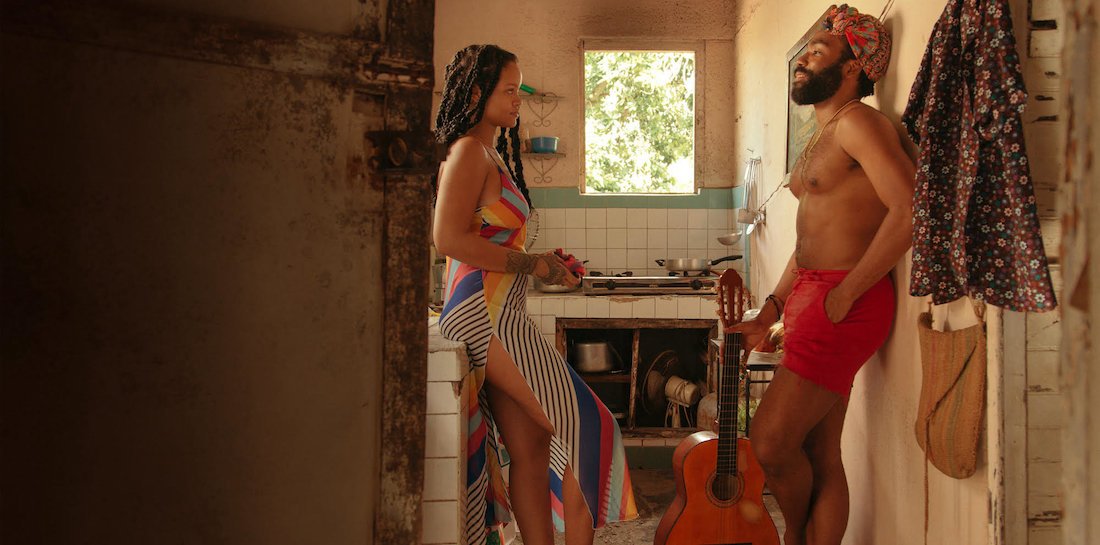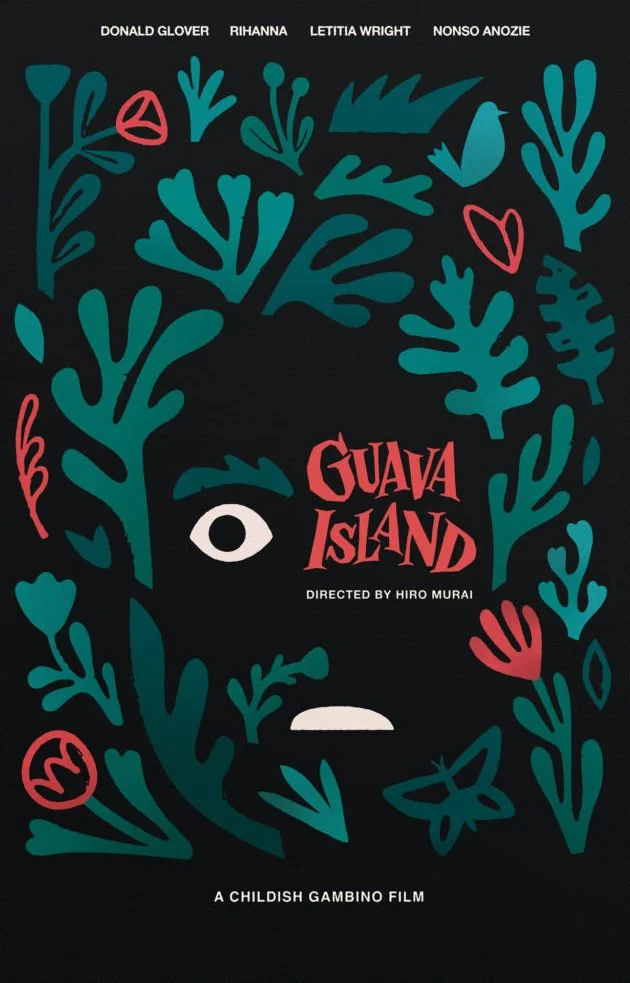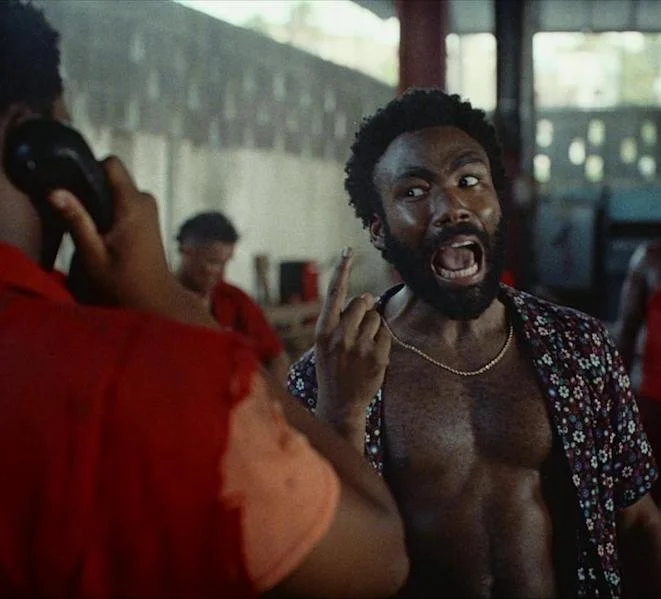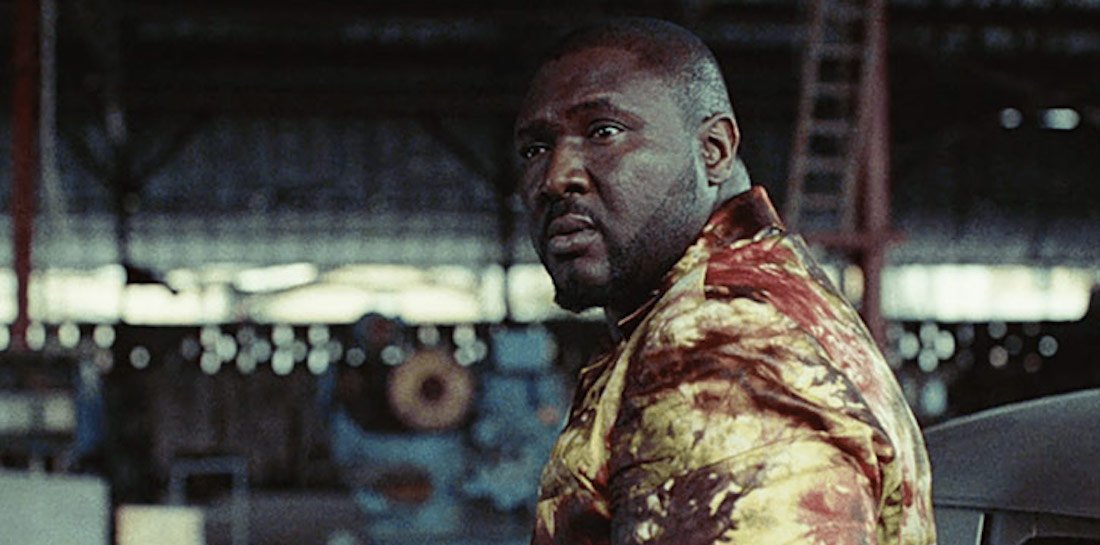GUAVA ISLAND (2019)
This week you should add a melodious fairy tale to your watchlist. While it is not necessarily as long as other feature-length works that range from an hour and twenty minutes to three or four hours, in retrospect I do believe that it possesses the same amount of magic as, say, Bill Kroyer’s FERNGULLY: THE LAST RAINFOREST. GUAVA ISLAND, directed by Hiro Murai with its screenplay written by Stephen Glover based on a story he wrote with his brother Donald Glover, Ibra Ake, Jamal Olori, and Fam Udeorji—all of whom have contributed to the FX comedy-drama series, Atlanta.
GUAVA ISLAND stars Donald Glover as Cuban musician, Deni Maroon, and Rihanna as his love interest, Kofi Novia, along with Nonso Anozie as the antagonist, Red. The film premiered at the Coachella Festival on April 11th, 2019—this week marks the three-year anniversary of its release. Shortly after its premiere it became available to stream on Amazon Prime. I have seen the film in the first year since it has been released but haven’t revisited it much until sitting down to write this piece. I do not want to spoil much of its plot if you haven’t seen it, but I would like instead to discuss some of its themes.
The film centers on Guava, an island in the middle of the ocean, “in the very center of the world,” where its occupants are made to serve an upper-class businessman.
Deni labors away during a Friday in the daytime before setting up a music festival concert later that night. However, Red tells him that he must not perform and should cancel the event because the people of the island must sleep early to wake up and resume work the next morning. He leaves the choice up to Deni, who approaches his fate in the second and third acts.
The Wonders Of What Can Be
In much of Donald Glover’s works there is a layer of surrealism over his narratives. This film is the first project of his to be neither television or a music video and, as such, is intended to be larger and cinematic. Kofi begins with a monologue to her child that Deni is a man who is full of love and full of life.
He aspires to bring peace to his homeland, through “a song that would unite the people of the island, a song that would remind us of the magic Guava had, even if just for one day.”
The story is surreal, and in that same manner, we have to see it as magical. Combined, we have a tale that is extraordinary and remarkable. Its plot suggests a way of living that could be possible, if not today, and neither tomorrow, then one day in the future. GUAVA ISLAND is as magical as FERNGULLY because of the way characters aspire to make changes in their worlds, no matter how big or small they may be.
America As A Mindset
While the film is surreal and magical, we must also take it with a sense of realism. Those who are familiar with Donald Glover’s musical journey as artist Childish Gambino might know some of his songs, “This is America,” “Summertime Magic,” and “Feels Like Summer,” which came out in mid-2018, as well as “Time,” which released on March 15th, 2020—i.e., the beginning of the Coronavirus pandemic.
Towards the end of the first act, Deni tells a co-worker, “America is a concept. Anywhere, where in order to get rich you have to make someone else richer, is America.” This is where the Grammy Award-winning track “This is America” provides its relevance. Without getting too political, GUAVA ISLAND is a critique on capitalist ideals; whereas Rihanna’s Kofi represents the magic of Guava, Anozie’s Red is the man in control as the governing force of the island. The film explores their different impacts on the island and how people can unite through a common interest.
One critical theory that I relevant to this discussion is French philosopher Michel Foucault’s concept of abnormality in human beings—more specifically his lecture on the exclusion of lepers and the inclusion of plague.
If we go back through history, we can think of people who have been infected by diseases and, when this exacerbates, some people are cast out and treated as lepers.
According to Foucault, governing authority excludes people from society by first including them.
They do this through the recording of their identities—their names, their loved ones, their homes, their workplaces, their interests, and so on—and then they are watched closely by figures of authority.
When Deni is sent to meet Red, he is told to sign his name on a nametag and stick it onto his shirt, whereas he argues who could just enter his office and state his name aloud. Later, the conclusion of the film demonstrates what is meant by exclusion of lepers, that is, who is cast out from Guava’s society. Western thought has influenced many people to do this to each other, not necessarily through what we conceive as “cancel culture” in the melodramatic sense, but even as the concept of the Same and the Other, where what is Same is participation in the socio-politco-economic ecological machine, whatever that may be, while the Other is no longer being a cog that ceases to fit, a part that is removed from the wheels.
Red vs Blue
Continuing the focus on Red’s office (since it is situated in the middle of GUAVA ISLAND and does not spoil the ending), next to his desk by the window is a bluebird in cage. As Deni stares at the bird, Red says what sounds to be “Jews,” snapping Deni out of his reverie, turning his attention back to Red, holding a pitcher of lemonade and offering a glass of juice. Later, Deni encounters a bluebird out in the world, but could it be the same bluebird?
It is interesting to note these colorful distinctions as representations of America’s political parties with red states (Republican) and blue states (Democratic). It could also be that Red represents control and power, and he is juxtaposed with the bluebird, which symbolizes soulfulness and freedom. As I mentioned earlier, Kofi as magic is juxtaposed alongside Red, so it could also be that she represents similar ideals as the bird.
Final Words
Guava Island has so much appeal in terms of pathos, logos, ethos, and kairos with these three primary characters that I believe it is deserving of more merit than when it was released. Even in our current state of living, there is a lot that we can find relevant.
With its 55-minute runtime, it does not drag on and tells the tale that needs to be told. In its essence, it is pure and poetic. The cinematography does not try too hard, and Glover’s singing is well-balanced with Rihanna’s acting performance. Even from her eyes, you can tell that she means business.
Overall, this is a film worthy of an hour’s worth of your time, and I hope you can take in its magic.








